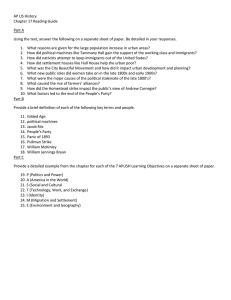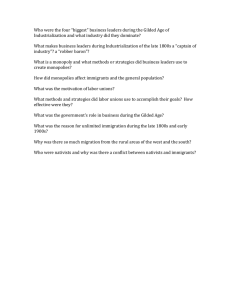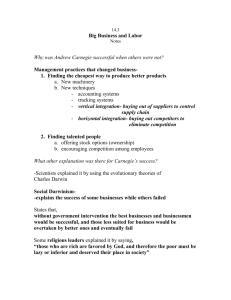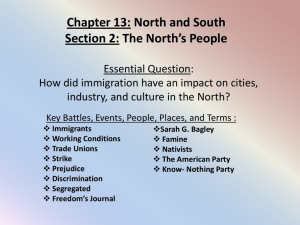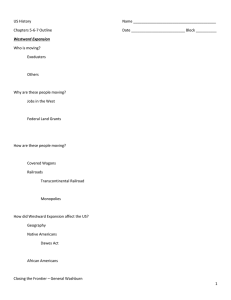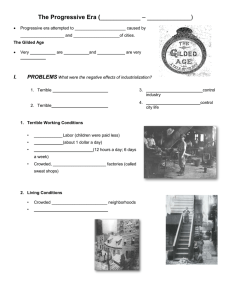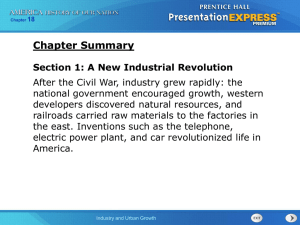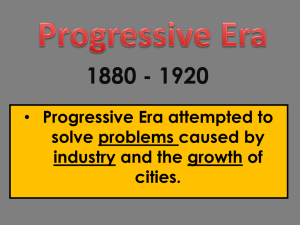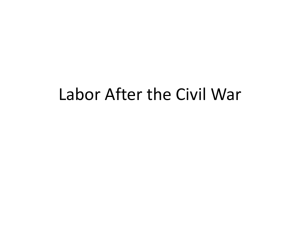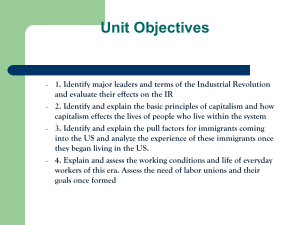Industrialization Test Study Guide
advertisement
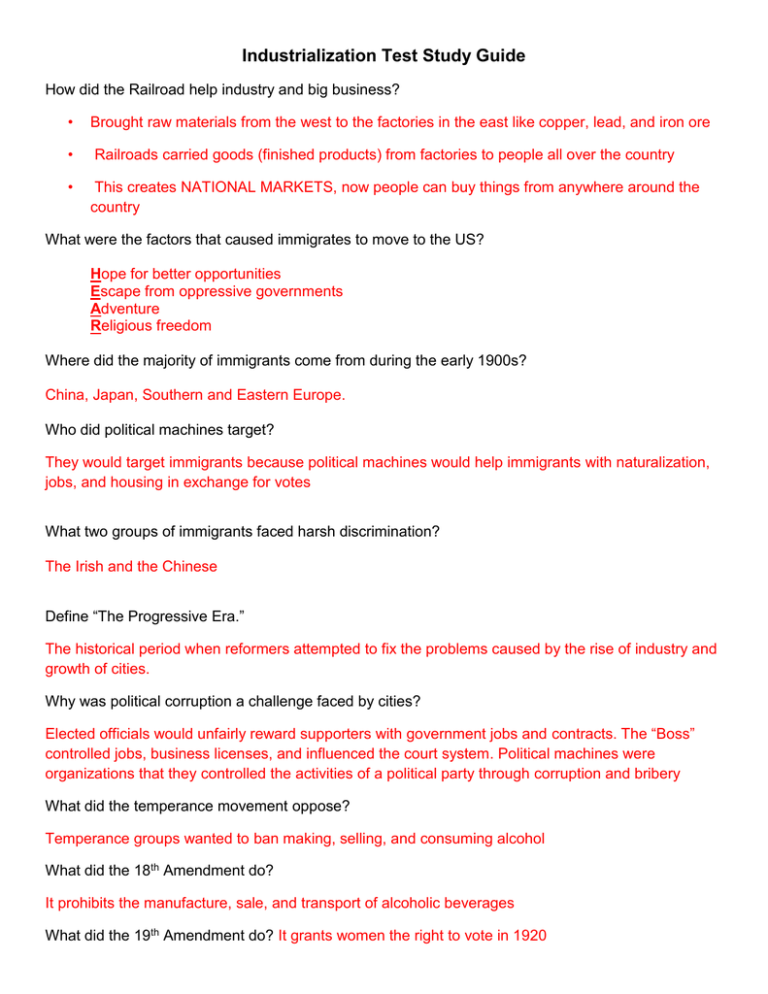
Industrialization Test Study Guide How did the Railroad help industry and big business? • Brought raw materials from the west to the factories in the east like copper, lead, and iron ore • Railroads carried goods (finished products) from factories to people all over the country • This creates NATIONAL MARKETS, now people can buy things from anywhere around the country What were the factors that caused immigrates to move to the US? Hope for better opportunities Escape from oppressive governments Adventure Religious freedom Where did the majority of immigrants come from during the early 1900s? China, Japan, Southern and Eastern Europe. Who did political machines target? They would target immigrants because political machines would help immigrants with naturalization, jobs, and housing in exchange for votes What two groups of immigrants faced harsh discrimination? The Irish and the Chinese Define “The Progressive Era.” The historical period when reformers attempted to fix the problems caused by the rise of industry and growth of cities. Why was political corruption a challenge faced by cities? Elected officials would unfairly reward supporters with government jobs and contracts. The “Boss” controlled jobs, business licenses, and influenced the court system. Political machines were organizations that they controlled the activities of a political party through corruption and bribery What did the temperance movement oppose? Temperance groups wanted to ban making, selling, and consuming alcohol What did the 18th Amendment do? It prohibits the manufacture, sale, and transport of alcoholic beverages What did the 19th Amendment do? It grants women the right to vote in 1920 What did the Progressive Movement focus on what it came to working conditions? Work day shortened, child Labor laws passed, wages increased, safety regulations What was the outcome of the Homestead Strike? In 1892 Carnegie lowered wages at his steel mill in Homestead, PA (near Pittsburgh), the union went on strike, the strike turned violent and 13 people died. This caused many Americans to turn against unions because they blamed unions for the violence. What are labor unions? What did labor unions fight for? Labor Union: An organization of employees that fights for better working conditions/pay They fight to improve working hours (less hours), to receive higher wages, and for better working conditions What were the negative effects of the working conditions during industrialization? Child Labor (children were paid less), low pay (about 1 dollar a day), long Hours (12 hours a day; 6 days a week), and crowded, unsafe factories (called sweat shops) What are the factors that led to the growth of industry? Access to raw materials, increase in labor, railroad, advertisement, new technology, mass production Fill in the charts below. Captain Industry Carnegie Steel Morgan Banking Vanderbilt Railroad/Shipping Rockefeller Oil City/Region Industry Detroit Automobiles Chicago Meat-packing Pittsburgh Steel New England Textiles Problem Living Conditions - Crowded Who tried to solve it? Jacob Riis tenement neighborhoods, dirty, no light, no fresh air Jane Adams Working Conditions - Low pay, long hours, dangerous Unsanitary dangerous meat packing industry Women’s voting rights - Women did not have a voice in government Could not hold public office Monopolies - High prices on goods Solution Riis - Published his book with pictures of how immigrants were living called “How the Other Half Lived” Adams - Created the Hull House (Chicago, IL) – Most famous settlement house in the USA Upton Sinclair, Labor Unions (American Federation of Labor) Sinclair - Published his book that exposed the dirty working conditions and unsafe/unhealthy practices used in meat and food factories, called “The Jungle” AFL - Led strikes in order to gain improved working conditions Jane Adams, Elizabeth Cady Stanton, Susan B. Anthony, Alice Paul, Suffragists Led suffrage movement (rallies, speeches) Theodore Roosevelt First president to use the Sherman Anti-trust Act, which limited the power of monopolies because powerful monopolies limited competition Helped get 19th amendment passed Low wages for workers Pick a Captain of Industry or Reformer (think back to the Press Conference) and answer the following questions as that person. USE YOUR NOTES FROM THE PRESS CONFERENCE TO COMPLETE THIS SECTION. Who are you? Is something wrong with America? What contributions have you made to America, or what reforms have you made to America? How did they help?
